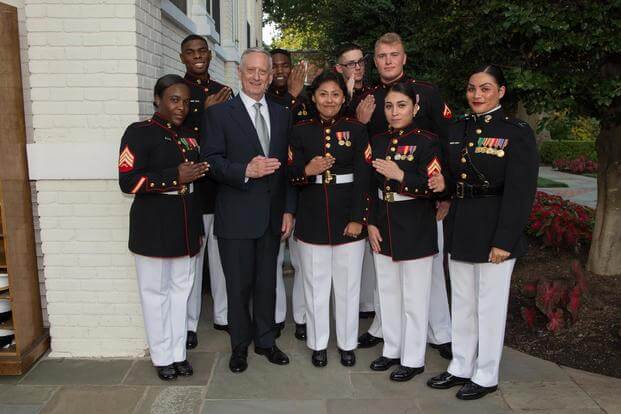Former Defense Secretary Jim Mattis suggested Tuesday that the nation should think again about putting young men and women together in ground combat units at a time when they tend to "grow very fond of one another."
Regarding women serving on the battlefield, "I'm not against the issue intrinsically," he said, but added that more leadership guidance is necessary to implement such a major cultural and societal change.
Mattis said his concern is that decisions on integrating women into combat units will be left to young lieutenants and noncommissioned officers in the field.
"When you're going to make a change that drastic, make sure that what you've done is set up those NCOs and young officers for success, and make sure it makes the military more lethal," he said.
Related: Mattis Warns Against Hasty Afghanistan Withdrawal, Avoids Criticizing Trump
The former defense secretary and retired Marine general added, "We had better not just say, 'Here, Sergeant, you figure it out. It's your problem.' No, no, no, it's society's problem."
Mattis noted the unique stresses of a combat environment, saying that careful thought should be given before putting young men and women in front-line units "at a time when they grow very fond of one another, and a respect for their sexuality should be part of that decision."
Mattis made the remarks at a Council of Foreign Relations forum in response to a question posed by former New York City Police Commissioner Ray Kelly, a retired Marine colonel, who asked whether women should be in Marine rifle platoons.
Under former Defense Secretary Ashton Carter, all military occupational specialties were opened to women who qualify, but Mattis said the integration into ground combat units poses unique challenges.
"We have to be darned careful" about how the policy is put into effect, he said.
In combat, "the veneer of civilization is peeled off you completely and, at times, you're just fighting to keep from going insane or losing your ethics and morality," Mattis said.
He has stoked the debate over women in combat before.
In a September 2018 address to cadets at the Virginia Military Institute, Mattis said, "Clearly, the jury is out" on whether women in combat roles make units more effective, "but what we're trying to do is give it every opportunity to succeed if it can."
He had been asked for his thoughts on the subject by a male VMI cadet, who noted that "there are a lot of badass women here," some of them more physically fit and smarter than he was.
Mattis said the policy on women in combat was "inherited" from Carter, but "I'm open to it, and I'll be working with the chief of staff of the Army and the others to sort it out."
His remarks at VMI brought criticism from the Service Women's Action Network advocacy group.
By saying he inherited the policy, Mattis was "tacitly endorsing efforts to undermine the success of the women currently serving in the infantry and in combat arms," the group said in a statement at the time.
-- Richard Sisk can be reached at Richard.Sisk@Military.com.
Read more: Sig Sauer Offers First Look at Weapons that Could Replace Army's M4 Carbine and M249















